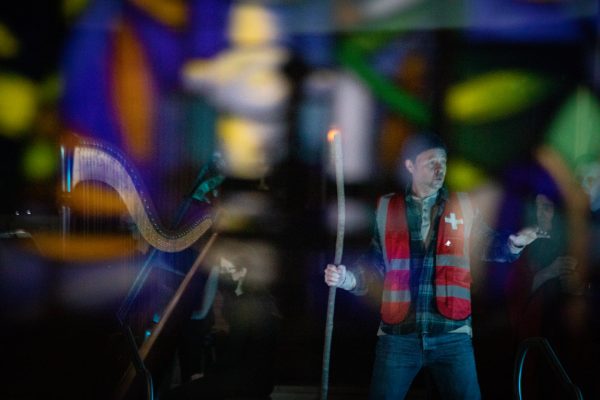Opera Concert Review: Benjamin Britten’s “Curlew River” — From Woundedness to Wholeness
By Jonathan Blumhofer
With its wide-ranging textual and musical materials, this “church parable” stands as one of Benjamin Britten’s most striking creations.

A scene from Enigma Chamber Opera’s production of Curlew River, streaming through November 5.
Enigma Chamber Opera (ECO) brought Benjamin Britten’s Curlew River to St. Paul’s Cathedral last week. For those who missed the live performance, an on-demand stream of the production is available through November 5.
Premiered at Aldeburgh in 1964, Curlew River is the first of Britten’s three “church parables” written with librettist William Plomer. With its wide-ranging textual and musical materials, though, it stands as one of his most striking creations. Essentially a Christianized adaptation of a Japanese Noh play the composer saw while in Japan in 1956, the parable recounts the story of a miraculous healing of a Madwoman at the grave of her young son.
Despite transposing the setting to England, Britten’s score retained many elements of Noh theater (including having the parts – including the Madwoman’s – sung by men). And, while the instrumental chamber group doesn’t utilize any Japanese instruments, Curlew River’s melodic profile sometimes evokes the Orient, especially over its climactic third with its mellifluous pseudo-pentatonic writing.
ECO’s production reduced the number of singers in the choral parts but, otherwise, adhered closely to Britten’s musical conception of the work (how near it stayed to the original’s Noh staging instructions I can’t say).
The four leading singers acquitted themselves superbly.
As the Madwoman, tenor Matthew DiBattista sang with winsome control and power. His voice has something of the tone of Peter Pears (who originated this role) but with a bit more warmth and sweetness to it. His accounts of the Madwoman’s two big scenes – the introductory monologue and the desolate aria at her son’s grave – were strongly, touchingly done.
Aaron Engebreth’s Ferryman was likewise bold-voiced and smartly articulated. There’s a certain hardness to the character, at least initially – he only lets the Madwoman board his ferry once she promises to sing for his and his passengers’ entertainment – but Engebreth brought plenty of humanity to the role and conveyed the Ferryman’s emotional transformation from apathetic to caring adeptly.
Likewise fine were Paul Soper’s Abbot and David McFerrin’s Traveller.
As the Spirit of the lost son, Linus Schafer Goulthorpe brought requisite radiant tone plus a mix of impressively precise diction and intonation to his short scene.
The instrumental ensemble, anchored by organist Edward Elwyn Jones, played with a terrific sense of character and, often enough, astonishingly precise timbral blending: indeed, the exchanges between horn, viola, and flute often sounded like different shadings of the same instrument. While certain balance issues periodically emerged between instruments and voices, the larger performance was tightly fused, musically.
ECO’s staging made smart use of the Cathedral’s space, with all of the action unfolding between the audience in the nave and the instrumentalists behind them in the chancel. Minimal props and costumes – a skiff made out of a tree branch for the Ferryman, a wig and purse for the Madwoman, for instance – kept the focus on the music and the narrative.
Before the performance began, ECO artistic director Kirsten Cairns described a conception of the work involving a small group of performers who’ve experienced the transition from trauma to hope. They travel around, then, telling this tale as an act of love.
Accordingly, ECO’s production developed this theme in various ways, most strikingly by way of a nifty framing device that had the leads emerging from the audience, masked; performing the drama, unmasked; and then returning to the house, re-masked.
To be sure, the reduced choral ensemble came at a small cost: having a substantial choir that joins in on the action reinforces the communal aspects of Curlew River (not to mention giving the piece a greater tonal presence at key moments). Even so, Cairns’ vision played out subtly and, by the end, the connections between the stage work’s theme of a small community helping an individual move from woundedness to wholeness and a similar, aspirational relationship between artists and their audiences came across powerfully.
Jonathan Blumhofer is a composer and violist who has been active in the greater Boston area since 2004. His music has received numerous awards and been performed by various ensembles, including the American Composers Orchestra, Kiev Philharmonic, Camerata Chicago, Xanthos Ensemble, and Juventas New Music Group. Since receiving his doctorate from Boston University in 2010, Jon has taught at Clark University, Worcester Polytechnic Institute, and online for the University of Phoenix, in addition to writing music criticism for the Worcester Telegram & Gazette.
